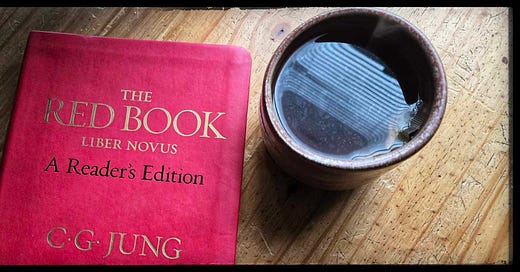Reflections on the arrival of Carl Jung’s Red Book, its connections to a lifelong love of books, the influence of mythology, and the importance of completing projects. It also highlights the value of friendship, humor, and the ongoing journey of creating meaningful work.
The Red Book: A Reader’s Edition by Carl Jung arrived today, thanks to an Amazon gift card earned at the paper factory. The card was a small, unexpected reward for simply doing the job already paid for, but it felt like a little bonus to life. This particular book has been on the wishlist for about 20 years. It wasn’t just the book’s arrival that stood out—it sparked a meaningful conversation with my wife and reminded me of the interconnectedness between the pots, the books, and the people who have influenced my journey.
Books have always been a passion alongside pottery. Carl Jung's work, for example, led to a deep appreciation for Joseph Campbell, whose ideas on mythology and storytelling first came to light during a world religion class in art school back in 1995. That year, not only was there an introduction to Campbell, but also to clay itself in Ceramics 1. The class professor—a blend of religious scholar and librarian—shared lectures that opened doors to mythology, metaphor, and storytelling. This was the foundation of many great conversations and ideas that continue to resonate. Those days were formative, linking clay and storytelling into an ever-expanding narrative.
The Red Book also brought memories of a long-time friend, Richard, whose home library is the stuff of legend. His house, with walls lined by shelves two books deep in almost every room, is an archive of his endless curiosity and research projects. Richard is a thinker, a collector of ideas and knowledge, but not much of a finisher. His projects often stall at the 90% mark before he moves on to another rabbit hole of discovery. Though time has taken away contact with the old professor, Richard remains a constant, always ready to lend a book or share a fascinating tidbit of information.
Unlike Richard, completing projects has become a point of pride. There’s something deeply satisfying about bringing a story, a pot, or an idea to its conclusion. It’s not about being better or more accomplished; it’s about embracing the process and its endpoint. Jokingly, there’s a thought to finish all of Richard’s projects someday, tackling that elusive 10% he leaves behind. Maybe he could return the favor by learning to fire the kilns and finishing some pots if the roles were reversed. The exchange of skills and ideas is part of what makes these connections so valuable.




